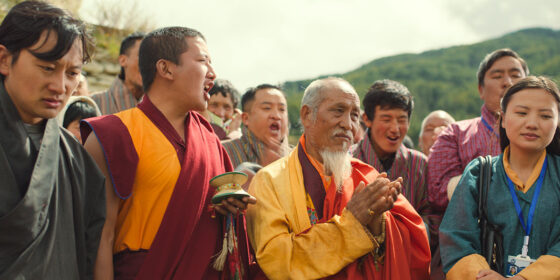TIFF 2023 | The Monk and the Gun (Pawo Choyning Dorji, Bhutan/France/USA/Taiwan) — Centrepiece

By Lawrence Garcia
The Godardian dictum that all you need to make a movie is a girl and a gun was never intended to be a model of plot construction. Whatever it meant to Griffith, to whom Godard attributed the phrase, it could not, for the latter, stand as a mere formula. Indeed, what films like À bout de souffle (1960) and Bande à part (1964) demonstrated with such clarity was the fact that artistic originality could no longer be a simple function of narrative newness—that novelty could not be equated with a novel plot. Filmmakers could no longer get by on the sheer unfamiliarity of their stories. Still, they can try, as Bhutanese writer-director Pawo Choyning Dorji does in The Monk and the Gun, a film that from its title on down mainly coasts on its juxtaposition of apparently incongruous elements. Set in 2006, the year the Kingdom of Bhutan transitioned into the world’s youngest democracy, the film observes four days of preparations leading up to a mock election, held in order to teach people how to vote. Meanwhile, in the mountain village of Ura, an elderly lama instructs a young monk (Tandin Wangchuk) to obtain a pair of guns by the same deadline, remarking that with all the changes underfoot in their country, “things need to be made right again.” At the same time, a local travel guide, Benji (Tandin Sonam), picks up a visiting American, Ron (Harry Einhorn), who is in the country looking for a rare firearm: an antique rifle that apparently dates back to the American Civil War. It is immediately apparent that these parallel lines of action will converge on (mock) election day. And though the film continually baits the possibility that this Buddhist lama will turn into Travis Bickle, a violent outcome is absurd enough that we are mainly led to wonder how things will resolve—which means that the bulk of the runtime plays like the setup for a joke.
The punchline is amusing enough, and features a sight-gag centered on the visiting American, which plays on the culturally divergent significances of guns and phalluses in Bhutan versus the US. It is also, however, indicative not just of the film’s more maladroit humour (e.g., a monk describing a bottle of Coke as “black water,” watching James Bond trailers on a television with the local village kids, or asking whether elections are “a new pig’s disease”), but also of its general perspective, which seems calibrated for a North American film festival audience. By the end, the film arguably places more emphasis on gun ownership in the US than on the genuine challenges and tensions created by Bhutan’s democratic reform. An election official at one point remarks that with all the international news coverage of Bhutan’s mock elections, it would be extremely embarrassing if the world saw empty polling stations. In following up his Oscar-nominated festival favourite, Lunana: A Yak in the Classroom (2019), Dorji, for his part, is not just aware that the world will be watching The Monk and the Gun, but seems to have made the film with that in mind. The thing about serving up something as pandering and pre-digested as this, though, is that while it may increase turnout, it will, in the long run, just be embarrassing for more people.
Lawrence Garcia

